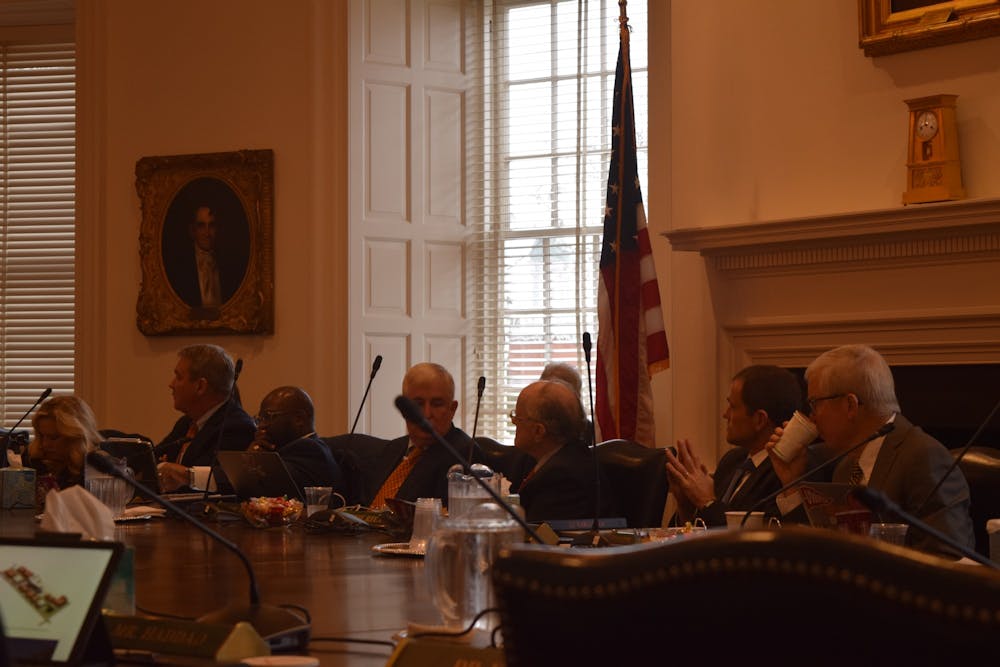The Board of Visitors’ Academic and Student Life Committee discussed the recent shooting and how to ensure that students feel connected to their peers and to the University during its Thursday meeting held from 3:15 p.m. to 4:30 p.m. in the Rotunda.
Three University students — second-year student Devin Chandler, third-year student Lavel Davis and fourth-year student D'Sean Perry — were fatally shot, while third-year student Mike Hollins and second-year student Marlee Morgan were injured. Both were later discharged from U.Va. Health.
To develop long-term plans in response to the shooting, Provost Ian Baucom said the University has formed a Recovery Working Group which convened in late November and is chaired by Steve Mull, vice provost for global affairs. University spokesperson Bethanie Glover said in an email statement to The Cavalier Daily that the Recovery Working Group to coordinate student and faculty support as well as planning for the spring semester.
“The group works closely with other divisions across Grounds to capture the full breadth of needs as we continue to recover from the shooting,” Glover said.
In addition to announcing the Recovery Working Group, Baucom explained that the University opened another grading option for this semester, allowing students to elect to convert their final grades to credit, general credit, or no credit with no change to their overall GPA. Students were also allowed to choose to take their grades as is.
Committee Chair Elizabeth Cranwell spoke about the impact of the tragedy on students and said that students were the first community members to take action toward healing.
“We grieve for the trauma brought upon them and for the loss of their safety and security, but we are so grateful for their stunning resilience,” Cranwell said.
The Committee then moved into discussions of general student wellness and programs that can help students to improve their sense of well-being.
Joseph Allen, professor of psychology and executive director of the Hoos Connected program, presented a report on the one-credit course program directed toward first-year and transfer students. The program, led by upper-class students who facilitate connection among students through deeper conversations about any topic, impacts student loneliness and sense of belonging by creating a small community in the classroom.
According to Allen, the long-term goals of the Hoos Connected Program are to encourage a deep connection to the University community as part of the University experience and create a cohort of students with the interpersonal skills needed for the workplace. The program aims to serve over 50 percent of incoming students each year.
“We found that the program, over the course of a semester, increased students' sense of school membership and belonging, and that’s what we’re trying to do,” Allen said.
The report found that students who participated in Hoos Connected were less lonely and felt more connected to the University community than a control group who did not participate in the program. The study further found that positive impacts on student loneliness were substantial in students of color and were also seen in students from lower socioeconomic status.
“[The] ultimate goal is to build this culture of awareness and understanding and support that takes advantage of the huge array of experiences that students bring to Grounds at U.Va.,” Allen said.
In addition to Hoos Connected, Josipa Roksa, Howard Hughes Medical Institute project director, gave an overview of two HHMI initiatives which also aim to improve student well being. The Driving Change initiative and Inclusive Excellence 3 both aim to support STEM students and Roksa announced that in November, HHMI pledged $2.5 million to the Driving Change Initiative and awarded the University $529,500 for Inclusive Excellence 3.
Roksa said that many undergraduate students who came to the University with an interest in STEM subjects, do not graduate with STEM degrees.
“We live in a world where data and technology are central to much of what we do … we don’t have enough people who are going to make this technology and make it better for us,” Roksa said.
In addition to the updates about programs to support student wellbeing, Gregory Fairchild, inaugural dean and chief executive officer of U.Va. NoVA presented his report on U.Va. NoVA — the University’s campus in Northern V.a. announced in September 2021.
The campus is designed to serve professional learners who majority work in the Northern Virginia area and are seeking additional education. Fairchild emphasized the importance of developing a campus in Northern V.a. because it is a metropolitan area with many highly educated residents.
“This is the leading arena for people to apply to U.Va., it is the leading arena for people to go after they leave U.Va.” Fairchild said. “It’s an important market for us in terms of development, connections and partnerships.”
The Board will convene next in March.







